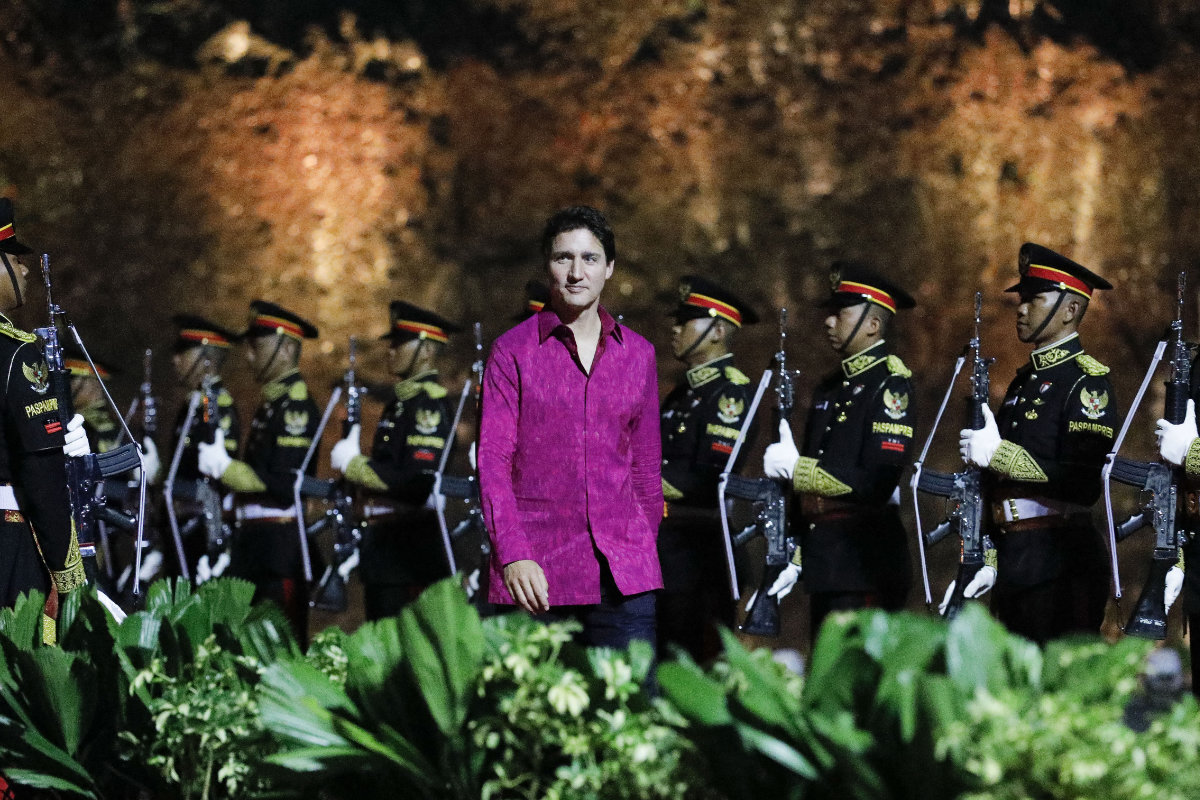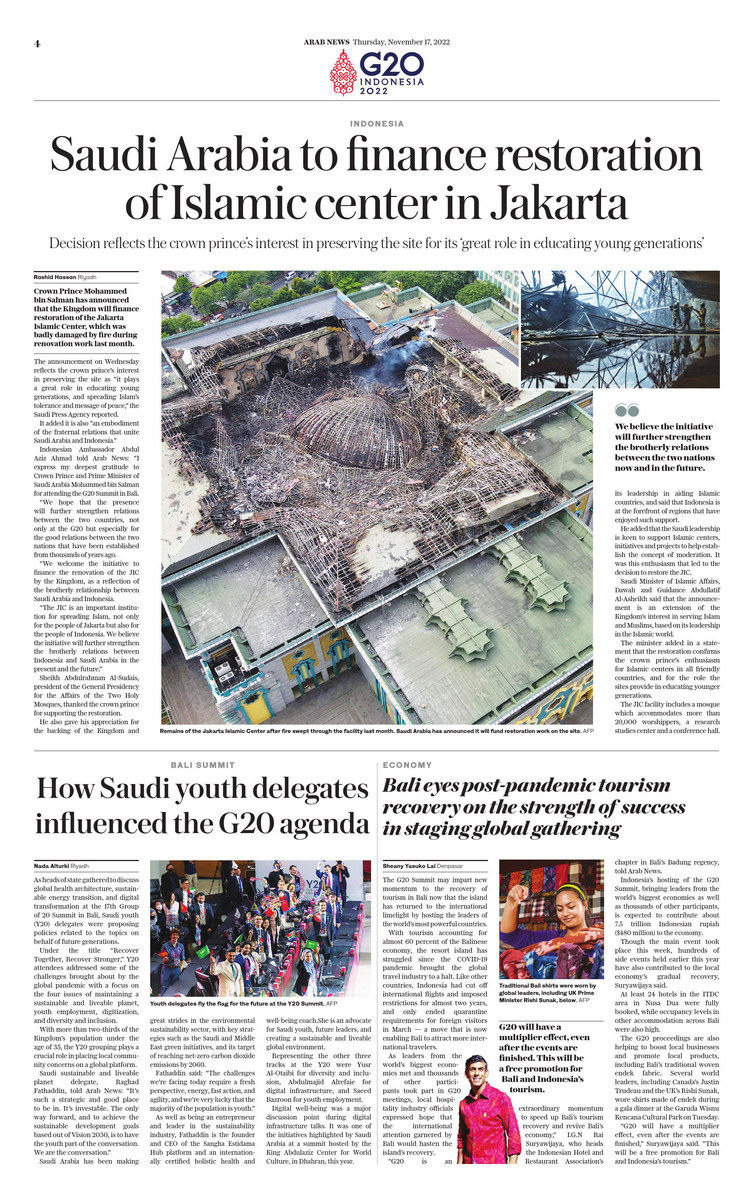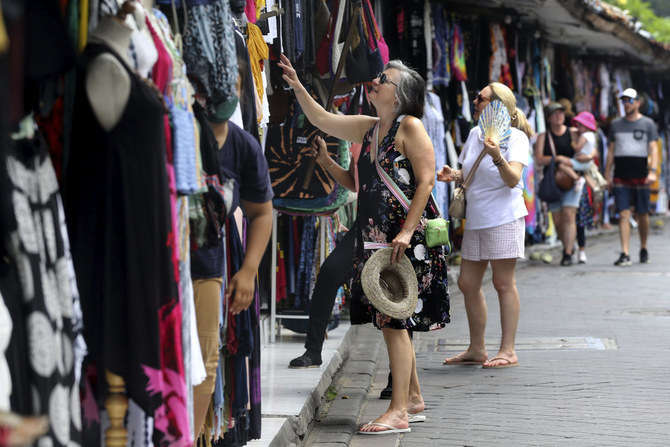DENPASAR, Indonesia: The G20 Summit may impart new momentum to the recovery of tourism in Bali now that the island has returned to the international limelight by hosting the leaders of the world’s most powerful countries.
With tourism accounting for almost 60 percent of the Balinese economy, the resort island has struggled since the COVID-19 pandemic brought the global travel industry to a halt. Like other countries, Indonesia had cut off international flights and imposed restrictions for almost two years, and only ended quarantine requirements for foreign visitors in March — a move that is now enabling Bali to attract more international travelers.
As leaders from the world’s biggest economies met and thousands of other participants took part in G20 meetings, local hospitality industry officials expressed hope that the international attention garnered by Bali would hasten the island’s recovery.

Indonesia's President Joko Widodo and his wife Iriana Widodo welcome British PM Rishi Sunak (R) at the G20 Summit in Bali on Nov. 15, 2022. (Willy Kurniawan / Pool / AFP)
“G20 is an extraordinary momentum to speed up Bali’s tourism recovery and revive Bali’s economy,” I.G.N Rai Suryawijaya, who heads the Indonesian Hotel and Restaurant Association’s chapter in Bali’s Badung regency, told Arab News.
Indonesia’s hosting of the G20 Summit, bringing leaders from the world’s biggest economies as well as thousands of other participants, is expected to contribute about 7.5 trillion Indonesian rupiah ($480 million) to the national economy, according to the central government.
Though the main event took place this week, hundreds of side events held earlier this year have also contributed to the local economy’s gradual recovery, Suryawijaya said.

Canada's Prime Minister Justin Trudeau arrives for the G20 welcoming dinner during the G20 Summit in Bali, Indonesia on Nov. 15, 2022. (Willy Kurniawan / Pool / AFP)
At least 24 hotels in the ITDC area in Nusa Dua were fully booked, according to Suryawijaya, while occupancy levels in other accommodation across Bali were also high.
The G20 proceedings are also helping to boost local businesses and promote local products, including Bali’s traditional woven endek fabric. Several world leaders, including Canada’s Justin Trudeau and the UK’s Rishi Sunak, wore shirts made of endek during a gala dinner at the Garuda Wisnu Kencana Cultural Park on Tuesday.

Local artisan making Balinese traditional hand-woven fabric called “Endek”. (Shutterstock)
“G20 will have a multiplier effect even after the events are finished,” Suryawijaya said. “This will be a free promotion for Bali and Indonesia’s tourism, and we are very optimistic that Bali will gain the title as the primary destination for world travelers.”
The number of foreign tourists, which has been increasing, reached 1.2 million during the first nine months of the year, according to official data. But that is still far from the record 6.2 million foreign visitors welcomed in 2019.
“G20 events, especially Indonesia’s G20 presidency, will have a huge effect on Bali,” Tjok Bagus Pemayun, the head of Bali’s tourism agency, told Arab News.

“With these international events attended by world leaders, it will promote Bali’s image as an international destination. The presence of delegates in Bali will undoubtedly impact its economy.”
To lure more travelers, Bali is planning on developing health tourism, hosting more international events and launching new promotional activities.
“We are optimistic. All this while Bali was seen for its cultural aspects, but now we can convince people to travel to Bali to seek health treatments or wellness through spa (services),” Pemayun said, adding that the island’s health tourism offerings will cover both medical and wellness aspects.
Bali’s tourism sector is also planning to attract more travelers from Saudi Arabia following the high-profile visit of Crown Prince Mohammed bin Salman.

Indonesia's President Joko Widodo welcomes Saudi Crown Prince Mohammed bin Salman at the G20 leaders' summit in Nusa Dua on Nov. 15, 2022. (Bandar Al-Jaloud photo via AFP)
“I am sure the crown prince’s visit will have a positive impact,” Pemayun said, adding that the provincial government is planning on collaborating with Indonesian missions in Arab countries to help promote the island destination.
“There are plenty of choices. Whatever Saudi tourists want, we have them here in Bali.”































